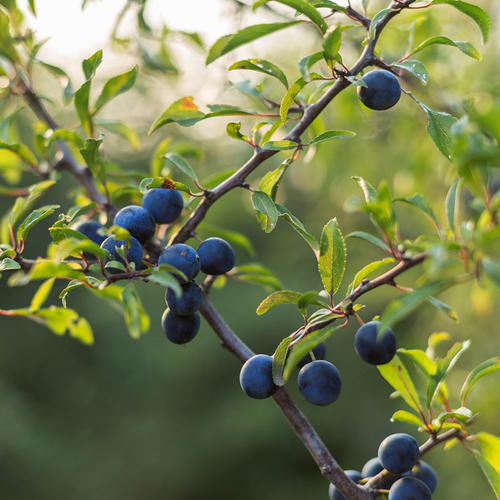
Blackthorn
Scientific names: Prunus spinosa
Family: Rosaceae
Alternate names: Blackthorn Berry, Blackthorn Flower, Blackthorn Fruit, Buisson Noir, Créquier, Endrino, Épine Noire, Épinette, Fourdinier, Mère-du-Bois, Pélosse, Pélossier, Prunellier, Pruni Spinosae Flos, Pruni Spinosae Fructus, Prunier Sauvage, Sloe, Sloe Berry, Sloe Flower, Wild Plum Flower
Background
Blackthorn is a shrub. The berry and dried flower are used as medicine.
People use blackthorn for the common cold, cough, fatigue, constipation, and other conditions , but there is no good scientific evidence to support these uses.
In foods, blackthorn is used in herbal teas, syrups, wines, and liqueurs.
People use blackthorn for the common cold, cough, fatigue, constipation, and other conditions , but there is no good scientific evidence to support these uses.
In foods, blackthorn is used in herbal teas, syrups, wines, and liqueurs.
Safety Safety definitions
When taken by mouth: Blackthorn flower is POSSIBLY SAFE when taken by mouth short-term. One to two cups per day of tea prepared with 1-2 grams of blackthorn flowers have been used with apparent safety. But blackthorn is POSSIBLY UNSAFE when the seeds or fresh flowers are used in large doses or long-term. These parts of the plant contain poisonous chemicals.
When applied to the skin: Blackthorn berries are POSSIBLY SAFE when applied to the skin, short-term. Traditionally, preparations containing 2-4 grams of blackberry fruit have been applied to the skin with apparent safety.
Breast-feeding: There isn't enough reliable information to know if blackthorn is safe to use when breast-feeding. Stay on the safe side and avoid use
When applied to the skin: Blackthorn berries are POSSIBLY SAFE when applied to the skin, short-term. Traditionally, preparations containing 2-4 grams of blackberry fruit have been applied to the skin with apparent safety.
Special Precautions & Warnings:
Pregnancy: Blackthorn seeds and fresh flowers are POSSIBLY UNSAFE for pregnant women because they contain chemicals that can cause birth defects. These chemicals can also cause toxicity.Breast-feeding: There isn't enough reliable information to know if blackthorn is safe to use when breast-feeding. Stay on the safe side and avoid use
Effectiveness
NatMed Pro rates effectiveness based on scientific evidence according to the following scale: Effective, Likely Effective, Possibly Effective, Possibly Ineffective, Likely Ineffective, Ineffective, and Insufficient Evidence to Rate.
Insufficient evidence Effectiveness definitions
- Common cold.
- Constipation.
- Cough.
- Fatigue.
- Indigestion (dyspepsia).
- Skin irritation.
- Sore mouth or throat.
- Stomach pain.
- Infections of the kidney, bladder or urethra (urinary tract infections or UTIs).
- Other conditions.
Dosing & administration
The appropriate dose of blackthorn depends on several factors such as the user's age, health, and several other conditions. At this time there is not enough scientific information to determine an appropriate range of doses for blackthorn. Keep in mind that natural products are not always necessarily safe and dosages can be important. Be sure to follow relevant directions on product labels and consult your pharmacist or physician or other healthcare professional before using.
Interactions with pharmaceuticals
It is not known if Blackthorn interacts with any medicines. Before taking Blackthorn, talk with your healthcare professional if you take any medications.
Interactions with herbs & supplements
There are no known interactions with herbs and supplements.
Interactions with foods
There are no known interactions with foods.
Action
There isn't enough information available to know how blackthorn might work.
vital.ly has licensed monographs from TRC Healthcare.
This monograph was last reviewed on 31/05/2023 10:00:00 and last updated on 25/11/2020 23:16:38. Monographs are reviewed and/or updated multiple times per month and at least once per year.
Natural Medicines disclaims any responsibility related to medical consequences of using any medical product. Effort is made to ensure that the information contained in this monograph is accurate at the time it was published. Consumers and medical professionals who consult this monograph are cautioned that any medical or product related decision is the sole responsibility of the consumer and/or the health care professional. A legal License Agreement sets limitations on downloading, storing, or printing content from this Database. No reproduction of this monograph or any content from this Database is permitted without written permission from the publisher. It is unlawful to download, store, or distribute content from this site.




